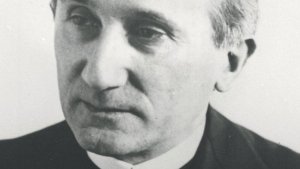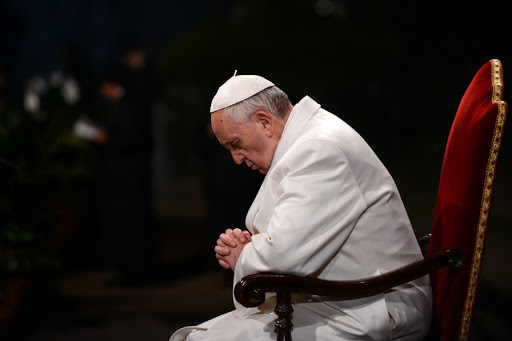Pope Francis on April 1 took up the Sixth Beatitude in his general audience address, considering what it means to see God, as it promises, “Blessed are the pure in heart, for they will see God.”
The Holy Father related it to Psalm 27, which says
“Come,” my heart says, “seek his face!” Your face, Lord, do I seek. Do not hide your face from me.
The pope said that this language, like language in the Book of Job, “manifests the thirst for a personal relationship with God, not mechanical, not a bit nebulous, no: personal.”
And very often I think that this is the path of life, in our relations with God. We know God by hearsay, but with our experience we go forward, forward, forward … and at the end we will know Him directly, if we are faithful…. And this is the maturity of the Spirit.
But in order to achieve this vision, this intimate relationship, the pope said we have to turn to our own hearts. The Emmaus disciples saw Jesus this way, but after their eyes were opened. Initially, according to Jesus, they were “foolish” and “slow of heart.”
And when the heart is foolish and slow, one does not see things. One sees things as though they were cloudy. Here lies the wisdom of this beatitude: to be able to contemplate, it is necessary to look deep within our hearts and make space for God; as Saint Augustine put it: “You were more inward to me than my most inward part” (Confessions, III, 6, 11).To see God it’s not necessary to change our glasses or the place from which we are looking, or to change the theological authors who teach us the way: our heart needs to be liberated from its own deceit. This is the only way.
The pope said that we have to realize that “our worst enemy is often hidden within our own hearts,” and that this is a “decisive maturation process.”
The most noble battle is that against the interior deceptions generated by our sins. Because sins change our inner vision, they change our evaluation of things, they make us see things that are not true, or at least that are not quite so true.
So purity of heart — keeping in mind the biblical understanding of the heart as the innermost place of the human being — is living “in the presence of the Lord, preserving in the heart what is worthy of a relationship with Him.”
A purified heart is, therefore, the result of a process that implies a liberation and a renunciation. The pure of heart is not born thus, he has lived an interior simplification, learning to renounce evil in itself, thus, in the Bible it is called circumcision of the heart (cfr Dt 10,16; 30,6; Ez 44,9; Jer 4,4).

Read more:
Understand yourself with these 7 amazing quotes from Romano Guardini
Giving God space
In order to reach this purity we have to recognize the part of the heart that is “under the influence of evil” … “to learn the art of letting oneself always be taught and guided by the Holy Spirit.”
The Holy Father added that, as with all the Beatitudes, there is a future dimension, since this seeing God is ultimately the joy of the Kingdom of heaven. “But there is also another dimension: to see God means discerning the designs of Providence in what happens, recognizing His presence in the Sacraments, His presence in our brothers and sisters, above all the poor and suffering, and to recognize God where He manifests Himself.”
The pope said that it’s “serious work” to allow this purification in ourselves, but it brings a “true peace.” Let us not be afraid, he urged:
This beatitude is a fruit of the preceding one: if we have heard the thirst for the good that dwells within us and are aware of living in mercy, the path to liberation which lasts all of our lives has begun and leads all the way to heaven. It is serious work, a work which the Holy Spirit does if we give Him space to do so, if we are open to the action of the Holy Spirit. Therefore we can say that it is God’s work in us – through the trials and purifications of life – and this work of God and of the Holy Spirit brings us to a great joy, a true peace. Let us not be afraid, let us open the doors of our heart to the Holy Spirit so that He might purify us and lead us forward in this journey towards full joy.

Read more:
Pope Francis: ‘Do Not Be Afraid of Holiness’
Here is a Vatican translation of the full text:
Today, together we read the sixth beatitude which promises the vision of God and has as a condition purity of heart.
One of the Psalms says: “ ‘Come,’ says my heart, ‘seek his face’; your face, Lord, do I seek! Do not hide your face from me” (27,8-9).
This language manifests the thirst for a personal relationship with God, not mechanical, not a bit nebulous, no: personal. Even the Book of Job expresses this as a sign of a sincere relationship. The Book of Job says: “By hearsay I had heard of you, but now my eye has seen you” (42:5).
And very often I think that this is the path of life, in our relations with God. We know God by hearsay, but with our experience we go forward, forward, forward, and at the end we will know Him directly, if we are faithful…. And this is the maturity of the Spirit.
How do we arrive at this intimacy, of knowing God with one’s eyes? We can think of the disciples of Emmaus, for example. The Lord Jesus is beside them, “but their eyes were prevented from recognising Him” (Lk 24:16). The Lord opens their eyes at the end of the journey which culminates in the breaking of the bread and had been initiated with a reproof: “How foolish you are! How slow of heart to believe all that the prophets spoke!” (Lk 24:25). That is the reproof at the beginning.
Here lies the origin of their blindness: their hearts were foolish and slow. And when the heart is foolish and slow, one does not see things. One sees things as though they were cloudy. Here lies the wisdom of this beatitude: to be able to contemplate it is necessary looking deep within our hearts and making space for God; as Saint Augustine put it: “You were more inward to me than my most inward part” (Confessions, III, 6, 11).
To see God it’s not necessary to change our glasses or the place from which we are looking, or to change the theological authors who teach us the way: our heart needs to be liberated from its own deceit. This is the only way.
When we realise that our worst enemy is often hidden within our own hearts, this is a decisive maturation process. The most noble battle is that against the interior deceptions generated by our sins. Because sins change our inner vision, they change our evaluation of things, they make us see things that are not true, or at least that are not quite so true.
It is, therefore, important to understand what “purity of heart” is. To understand this we need to recall that in the Bible, the heart does not consist solely in sentiments, but it is the most intimate place of the human being, the interior space where a person is him or herself. This, according to the Biblical mentality.
The same Gospel of Matthew says: “If the light in you is darkness, how great will the darkness be!” (6:23). This “light” is the gaze of the heart, its perspective, your synthesis, the point from which you read reality (cfr Ap. Exhort. Evangelii gaudium, 143).
But what does it mean to have a “pure” heart? The pure in heart live in the presence of the Lord, preserving in their hearts what is worthy of a relationship with Him; only in this way do they possess a “unified” life, linear, not winding but simple.
A purified heart is, therefore, the result of a process that implies a liberation and a renunciation. The pure of heart is not born thus, he has lived an interior simplification, learning to renounce evil in itself, thus, in the Bible it is called circumcision of the heart (cfr Dt 10,16; 30,6; Ez 44,9; Jer 4,4).
This interior purification implies the recognition of that part of the heart that is under the influence of evil – “You know Father, I feel this, I think this, I see this, and this is bad”: recognising the ugly part, the part that is obfuscated by evil – to learn the art of letting oneself always be taught and guided by the Holy Spirit.
The journey of the ailing heart, the sinning heart, the heart that no longer sees things well, because it is in sin, to the fullness of the light of the heart, is the work of the Holy Spirit. It is He Who guides us to fulfil this task. Thus, through this journey of the heart, we will reach the point of “seeing God.”
In this beatific vision, there is a future, eschatological dimension, as with all the Beatitudes: it is the joy of the Kingdom of Heaven toward which we move. But there is also another dimension: to see God means discerning the designs of Providence in what happens, recognising His presence in the Sacraments, His presence in our brothers and sisters, above all the poor and suffering, and to recognise God where He manifests Himself (cf Catechism of the Catholic Church, 2519).
This beatitude is a fruit of the preceding one: if we have heard the thirst for the good that dwells within us and are aware of living in mercy, the path to liberation which lasts all of our lives has begun and leads all the way to heaven. It is serious work, a work which the Holy Spirit does if we give Him space to do so, if we are open to the action of the Holy Spirit. Therefore we can say that it is God’s work in us – through the trials and purifications of life – and this work of God and of the Holy Spirit brings us to a great joy, a true peace. Let us not be afraid, let us open the doors of our heart to the Holy Spirit so that He might purify us and lead us forward in this journey towards full joy.

